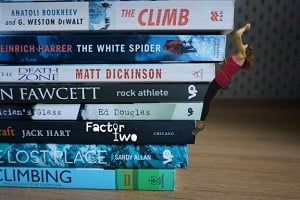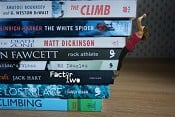
The current thread on route-setting and the discussion of the relative importance of different muscle groups got me thinking about teaching the GCSE PE climbing module at the wall, back when such things were possible. Early on I'd tell the kids climbing was 70% fingers, 20% core and 10% shoulders. This was partly as a corrective to the lads thinking it was all about their guns. (Bear in mind that I wasn't presenting a learned paper at a Biomechanics convention, and I was talking about muscles rather than proprioception or technique or tactics etc etc...).
However, now I think about it I've no idea where I got this very rough and ready figure. I assumed I'd read it but can't find where. Maybe I made it up. Anyone else ever come across it or something similar?
> Early on I'd tell the kids climbing was 70% fingers, 20% core and 10% shoulders.
I hope you also added that, for beginners, the remaining 80% is footwork!
Never come across it in percentage forms like that...
However I say that climbing (especially when you're starting out) is 80% technique 20% strength anyway. Like you I'm not sure if somebody told me that or if I made that up!
Also for those who can't one leg squat this can be the limiting factor on anything slabby
> I hope you also added that, for beginners, the remaining 80% is footwork!
Believe me, if you're trying to teach climbing to teenage lads who are inordinately proud of their guns, you spend plenty of time talking about footwork! My first objective was to stop them trying to campus everything.
Why bother learning technique when you can campus everything?
> Why bother learning technique when you can campus everything?
I did say trying to campus! Their failure is your friend when it comes to teaching cocky teenage lads.
I always thought it was 20% training (strength, fitness, technique) and 80% mental. I'm not sure that'll really interest teenage lads though
I always remember the late Eric Jones saying that balance was the most important factor in climbing.
Balance, finger strength, technique and footwork are the key factors for me now.
Actually for me it's more like 20% talking about climbing, 20% thinking about climbing, 20% looking at gear, 10% climbing, and the rest thinking up reasons as to why it wasn't my fault that I couldn't finish that route...
Just an observation I've made in my own training over the last year, I had plateaued for over 2 years with my finger strength, fingerboarding consistently doing the recommended work outs. Then someone pointed out that my shoulders where giving up before my fingers. So I've upped my shoulder work, mainly kettlebell exercises. Results; my finger strength has jumped massively, (well the results from fingerboard tests have) I suspect my fingers aren't actually stronger but the extra shoulder strength is allowing me to actually pull and apply the strength I have.
What I'm trying to say is that I think there is a bigger balance between finger strength and shoulders than people focus on. All good having bulletproof fingers but if anything down the chain is weak you aren't going to be able to apply that force.
The % will vary from person to person and discipline to discipline.
For beginners indoor climbing I'd give:
50% technique
10% fingers
10% strength vs flab
10% coordination, flex and mobility
10% core
For comp performance I'd put:
40% mental attitude towards training
20% mental attitude towards performing
20% physical gifts
20% luck with injuries
For trad I'd put:
25% experience
25% head space
25% technique
25% physical talents
I thought it was: 10% strength, 15% ability and 75% shutting up and paying attention to what I'm saying!
> Why bother learning technique when you can campus everything?
IIRC in the mid 90's there was chalk graffiti above the Foundry reception stating "Plyometrics for heroes, technique for zeros".
I found something similar when I was younger re. pull-up power and it's effect on my fingerboard benchmarks.
In fact, when I had a particularly stubborn fingerboard max hang that I was trying, one of my go-to tricks was to do a couple of pull-ups with close to max weight (120lbs or so) a couple of minutes before an attempt.
Thanks for all the answers so far. I certainly agree with all those who've emphasised the much greater significance of technique rather than strength for beginners - but this wasn't actually what I was trying to remember. If we leave aside all the other more important factors, and just focus on strength for a moment, what do each of the key muscle groups contribute?
I think I've probably made up the percentages I quoted - but I've never been one of those teachers who say, "I'm not sure of the answer, I'll get back to you." I always preferred to maintain the illusion of infallibility, bullshitting as required. I reckon this was preferred by most kids - and, come to that, by most staff when I was a head. Of course, you can't afford to ever get found out!
> I always remember the late Eric Jones
You know he’s still alive right? Assuming you mean THE Eric Jones.
I remember reading somewhere that with weak shoulders you body limited how much force could be applied at full extension of the arm. Something to do with protecting the joint structure. I'm trying to dig out where I found it.
Having ran a load of intro to climbing sessions for local primary school children the ones who do really well are those with a gymnastics background - they have the balance, proprioception all over strength to move well over the wall - what we would call technique. The actual footwork and finger strength and be learned/trained.
So don't downplay the importance of a joined up body.
As I said upthread, these muscle group percentages relate to one tiny part of my teaching of the GCSE, specifically concerned with strength in isolation, not as it relates to any other aspect of the varied climbing skillset. I'm well aware of how well gymnasts take to climbing. Maybe it's not so obvious with primary age kids, but you see the same thing with dancers in every cohort. The fact that in the huge majority of cases these are all girls always give me some amusement when the cocky teenage lads find they're getting burned off and can't at first see why. Valuable learning in all sorts of ways.
The last time I went through the research on physical parameters in climbing, the consensus was that finger strength had the strongest correlation to performance, followed at a distance by shoulder girdle strength and hip flexibility.
The correlations only seem to hold true above about 7b (sport).
Lots of reading around it can be found here:
> I remember reading somewhere that with weak shoulders you body limited how much force could be applied at full extension of the arm. Something to do with protecting the joint structure. I'm trying to dig out where I found it.
The limiting effect is mentioned in a few texts, definitely. Isn't it one of the rationales for things like max hangs and weighted pull ups for example? Neural recruitment and overload to reset that limit? Can't remember the details.
To misquote the freak brothers (can't remember which one)
Technique will carry you through times of no strength better than strength will carry you through times of no technique.
Or was it the other way around?
Oops 😬
> I always remember the late Eric Jones saying that balance was the most important factor in climbing.
> Balance, finger strength, technique and footwork are the key factors for me now.
Apologies. Let me rephrase that!!!!
The GREAT Eric Jones!!!
> The last time I went through the research on physical parameters in climbing, the consensus was that finger strength had the strongest correlation to performance, followed at a distance by shoulder girdle strength and hip flexibility.
> The correlations only seem to hold true above about 7b (sport).
> Lots of reading around it can be found here:
Thanks John, that's very useful.
Definitely! Shoulder and core strength are incredibly important, one of the best things I ever did was buy a set of rings and then start doing these exercises.
https://www.youtube.com/watch?v=Xo2kmli9rBA&ab_channel=UKClimbing
The improvement in overall body tension and control especially on the steep/board was noticeable very quickly, it just felt like my fingers had to try a lot less hard to stay on and all of a sudden moves that were impossible before started to unlock.
> Balance, finger strength, technique and footwork are the key factors for me now. <
Personally I think being light and having reasonable finger strength made me confident that I could often stop myself if I slipped, and that in turn gave me confidence to use good technique which didn't itself require the strength. After a gap of many years I repeated a couple of routes that I had once easily soloed....I was glad of rope and runners. I think this was simply because I was weaker and afraid of falling.
This was years ago so nowadays perhaps many people are prepared to fall with better protection and get strength and confidence from gyms, sport climbing etc.
I've heard the "70% fingers, 20% core, 10% upper body" quote before. I always thought it came from Ben Moon but I could be totally imagining that.
> I've heard the "70% fingers, 20% core, 10% upper body" quote before. I always thought it came from Ben Moon but I could be totally imagining that.
I was beginning to think I'd made it up! Unless anyone else says different, I'll credit it to Ben Moon next time.
By the way, Wolf Mountain is the wall I was referring to.








